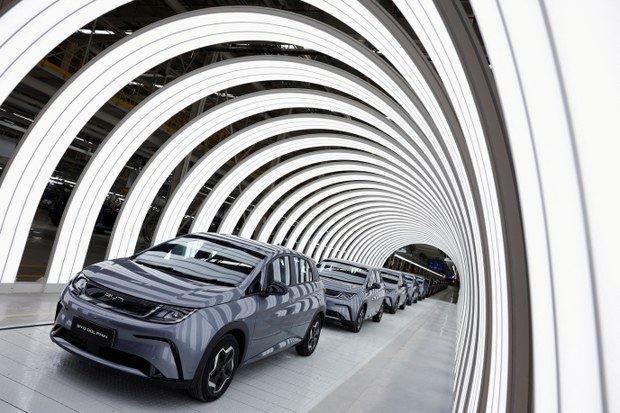
With the increasingly complex global trade environment, trade disputes sometimes arise. Recently, the European Union announced that it will impose temporary countervailing tariffs on imported electric vehicles from China, which has attracted widespread attention and discussion worldwide. Many people are concerned whether this means that a trade war is about to break out between China and Europe.
According to the announcement of the European Commission, starting from July 2024, temporary countervailing duties of 17.4% to 38.1% will be imposed on electric vehicles originating from China, in addition to the existing 10% tariff. This decision has a particularly significant impact on major Chinese car manufacturers such as BYD, Geely Holdings, and SAIC Group. For other manufacturers, the European Commission proposes to impose a 21% tariff, while Tesla cars imported from China may be subject to a separate tax rate.
Behind this measure is the European Commission's anti subsidy investigation into China's electric vehicle industry. However, since the start of the investigation, multiple domestic and foreign car companies have expressed opposition to the EU's decision, believing that this will not only seriously harm the legitimate rights and interests of Chinese and European car companies, but also distort the fair competition environment for Chinese electric car companies in the European market, further impacting normal economic and trade exchanges between China and Europe in the automotive and related fields.
Despite strong opposition from the Chinese government and car companies, the implementation of the EU's tariff hike seems to be a foregone conclusion. In addition, European car giants such as BMW, Volkswagen, Mercedes Benz, etc. have stated that the European Commission's approach will have more drawbacks than benefits and will have negative consequences. Chinese car companies such as SAIC Group and Geely Holding have also issued statements, stating that the relevant measures taken by the European Commission violate market economy principles and international trade rules, and will resolutely safeguard their legitimate rights and interests as well as the interests of global users.
In fact, the EU's recent imposition of tariffs on Chinese electric vehicles may not only affect trade relations between China and Europe, but also have a profound impact on the global automotive market landscape. In the context of global economic integration, trade protectionism measures are no different from a "headwind" behavior. They not only fail to solve problems, but may also exacerbate trade frictions and hinder the development of the global economy.
Looking back at history, trade wars often have serious economic and social consequences. The EU's imposition of tariffs on Chinese electric vehicles this time has undoubtedly dropped an uncertain "bomb" on global economic and trade relations. Although both China and Europe are striving to find a solution, the future direction of trade relations is still full of uncertainty.
It is worth emphasizing that trade wars are not the best way to solve problems. On the contrary, both parties should seek more reasonable and fair solutions through dialogue and negotiation. Both China and Europe should fully recognize that trade protectionism is not a long-term solution, and win-win cooperation is the correct path for global economic development.
In the long run, China and Europe should abandon the zero sum game mentality, strengthen cooperation, and face challenges with an open, inclusive, and cooperative attitude. By strengthening communication, enhancing understanding, and expanding cooperation, we can jointly promote the prosperity and development of the global economy.
Overall, the EU's move to impose tariffs on Chinese electric vehicles has attracted global attention and also exposed hidden concerns of global trade protectionism. However, through the joint efforts and consultations of both China and Europe, it is believed that the outbreak of a trade war can be avoided and the sustainable development of the global economy can be jointly maintained.

On January 14 local time, an announcement from the U.S. Department of State sent shockwaves across the globe: starting immediately, the United States will suspend all immigrant visa applications from 75 countries, citing the need to crack down on applicants who may become "public charges."
On January 14 local time, an announcement from the U.S. Dep…
Recently, there has been another turmoil in the US financia…
Recently, the International Energy Agency released the "Wor…
On January 7th local time, a gunshot in Minneapolis once ag…
In early 2026, Musk announced through both social media and…
Against the backdrop of profound adjustments in the global …